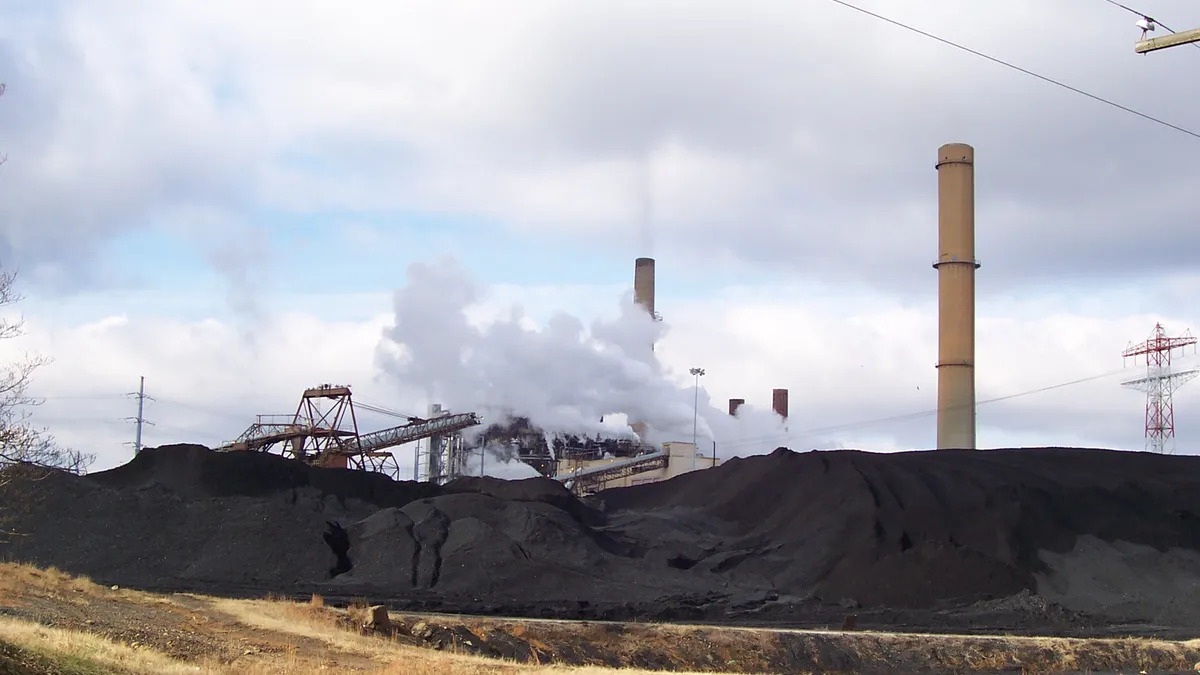Dive Brief:
-
A lawyer for Consolidated Edison, Exelon and seven other utilities on Monday urged the Supreme Court to reject a challenge to the Environmental Protection Agency's authority to regulate greenhouse gas (GHG) emissions from power plants on a fleetwide basis.
-
A coalition of states led by West Virginia and an attorney for North American Coal, a coal company, argued the Clean Air Act requires the EPA to regulate generating facilities by setting emissions standards individual power plants can meet. They want the Supreme Court to disallow a fleetwide approach.
-
With a decision expected by late June, the case has implications for how the EPA moves forward on GHG regulations for the power sector, Carrie Jenks, executive director of the Harvard Law School's Environmental & Energy Law Program, said Tuesday.
Dive Insight:
The debate at the Supreme Court in West Virginia v. EPA could affect the Biden administration's options for meeting its goal of setting the United States on a path to having emissions-free electricity by 2035 and being carbon-free across the economy by mid-century.
"It is clear that Congress and the [Supreme] Court think that EPA should be regulating greenhouse gases from the power sector," Jenks said. "The question is how, and we don't know the how, because we don't have a rule from EPA. So that's what's unique about this case, and which is making everyone focused on it, because the court obviously took the case and wants to say something about it."
The case grew out of the Obama administration's Clean Power Plan, which set broad emissions reduction targets for the power sector, the second leading source of U.S. carbon emissions, but was stayed by the Supreme Court in 2016 before it took effect.
The Trump administration replaced it with the less-stringent Affordable Clean Energy (ACE) rule. However, the U.S. Court of Appeals for the District of Columbia Circuit in January 2021 vacated that rule, saying the EPA took a too-narrow view of its authority to regulate carbon emissions from power plants. West Virginia, coal companies and others contend the appeals court erred in vacating the ACE rule.
That appeals court decision granted the EPA sweeping powers that are outside its authority, according to Lindsay See, West Virginia solicitor general.
"The D.C. Circuit decision gave EPA much broader power, power to reshape the nation's energy sector, or most any other industry for that matter, by choosing which sources should exist at all and setting standards to make it happen," See said during arguments Monday at the Supreme Court.
Supreme Court Associate Justice Elena Kagan noted the Clean Air Act sets limits on the EPA when it creates air regulations, for example by requiring the agency to consider the cost of a regulation.
Those considerations may be unbound in the context of climate change, according to See.
"If EPA is looking at the national or grid-wide level and if it's dealing with an issue as massive as climate change, it's hard to see what costs wouldn't be justified," See said.
The Clean Air Act gives the EPA the authority to adopt fleetwide carbon regulations, Beth Brinkmann, a Covington & Burling attorney representing a group of utilities, told the court.
"For years, the power companies have used emissions trading, generation shifting, and other measures to reduce emissions while keeping the lights on at reasonable cost," Brinkmann said. "The ACE rule would eliminate significant long-standing, cost-effective means of lowering emissions."
Utilities in the group include National Grid USA, New York Power Authority, Sacramento Municipal Utility District, Los Angeles Department of Water and Power, Pacific Gas and Electric, Puget Sound Energy and Seattle City Light.
Edison Electric Institute, a trade group for investor-owned utilities, and a water utility trade group in January filed a brief supporting the EPA's position, in part saying if the agency isn't allowed to regulate carbon emissions, individual power plants and water facilities could face lawsuits over their emissions.
Apple, Google, Tesla and 13 other companies also filed a brief supporting the EPA.
The Supreme Court should dismiss the case because neither the ACE rule nor the Clean Power Plan is in place, according to U.S. Solicitor General Elizabeth Prelogar.
"Petitioners aren't harmed by the status quo," Prelogar said, noting the EPA is preparing to propose a GHG rule by the end of this year. "What they seek from this court is a decision to constrain EPA's authority in the upcoming rulemaking."
The EPA cannot revive the Clean Power Plan because its deadlines have passed and its emissions reductions targets have already been met, Prelogar said.
West Virginia and its allies are seeking an "advisory opinion" from the Supreme Court to affect the upcoming rulemaking, Richard Revesz, a professor at the New York University School of Law, said, noting the court doesn't have the authority to issue them.
Echoing arguments made by Prelogar, Revesz said the Clean Power Plan is obsolete and would need to go through a rulemaking process before it could be resuscitated. The court should dismiss the case, he said.
Oral arguments were held the same day the U.N. Intergovernmental Panel on Climate Change said human-induced climate change is causing "dangerous and widespread" disruption in nature and affecting billions of people.
"Any further delay in concerted global action will miss a brief and rapidly closing window to secure a liveable future," IPCC Working Group II Co-Chair Hans-Otto Pörtner said.















